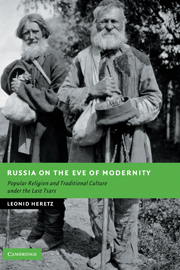Book contents
- Frontmatter
- Contents
- Acknowledgments
- Introduction
- 1 The traditional worldview
- 2 The Old Believers: modernization as apocalypse
- 3 The sectarians: dualism and secret history
- 4 Folk eschatology
- 5 The assassination of Alexander II (1881) and folk Tsarism
- 6 The year of famine and cholera (1891–1892): demonization of the nobility
- 7 The Japanese War: peasant Russia and the wider world
- 8 1905: revolution or reaction?
- 9 The Great War and the crisis of the traditional culture
- Epilogue
- Bibliography
- Index
- NEW STUDIES IN EUROPEAN HISTORY
Introduction
Published online by Cambridge University Press: 23 December 2009
- Frontmatter
- Contents
- Acknowledgments
- Introduction
- 1 The traditional worldview
- 2 The Old Believers: modernization as apocalypse
- 3 The sectarians: dualism and secret history
- 4 Folk eschatology
- 5 The assassination of Alexander II (1881) and folk Tsarism
- 6 The year of famine and cholera (1891–1892): demonization of the nobility
- 7 The Japanese War: peasant Russia and the wider world
- 8 1905: revolution or reaction?
- 9 The Great War and the crisis of the traditional culture
- Epilogue
- Bibliography
- Index
- NEW STUDIES IN EUROPEAN HISTORY
Summary
Imperial Russia in the last decades of its existence provides an intensely fascinating field of inquiry for the historian and for anyone with an interest in the manifestations of the human spirit. Russia at the turn of the century was a country and a civilization of astounding cultural complexity and wealth. The Empire, with its vast expanse and the multitudes of peoples it held in its sway, was an entire world in its own right. Morever, this world encompassed the extremes of historical development, producing arts and sciences of the most advanced and innovative sort, while allowing for the continued existence of traditional cultures of the most archaic nature. The vitality and intricacy of the Empire's civilization arose from the interaction of the dynamic principle of modernization with the more passive yet extremely resilient force of tradition. The thought and activity of Russia's Westernized elite in that period has been the subject of extensive study. This work is meant to be a contribution to the contemporary scholarly effort to fill the great gap in the historical picture by bringing to light the beliefs and ideas of the great mass of the Russian population which continued to live within the traditional culture.
THE PERSISTENCE OF TRADITION
Russia's place in twentieth-century consciousness has been determined by the Revolution of 1917 and the subsequent decades of Communist rule. Inevitably and understandably, people's interest in Russia's past has centered on identifying the causes of the revolutionary upheaval.
- Type
- Chapter
- Information
- Russia on the Eve of ModernityPopular Religion and Traditional Culture under the Last Tsars, pp. 1 - 13Publisher: Cambridge University PressPrint publication year: 2008

